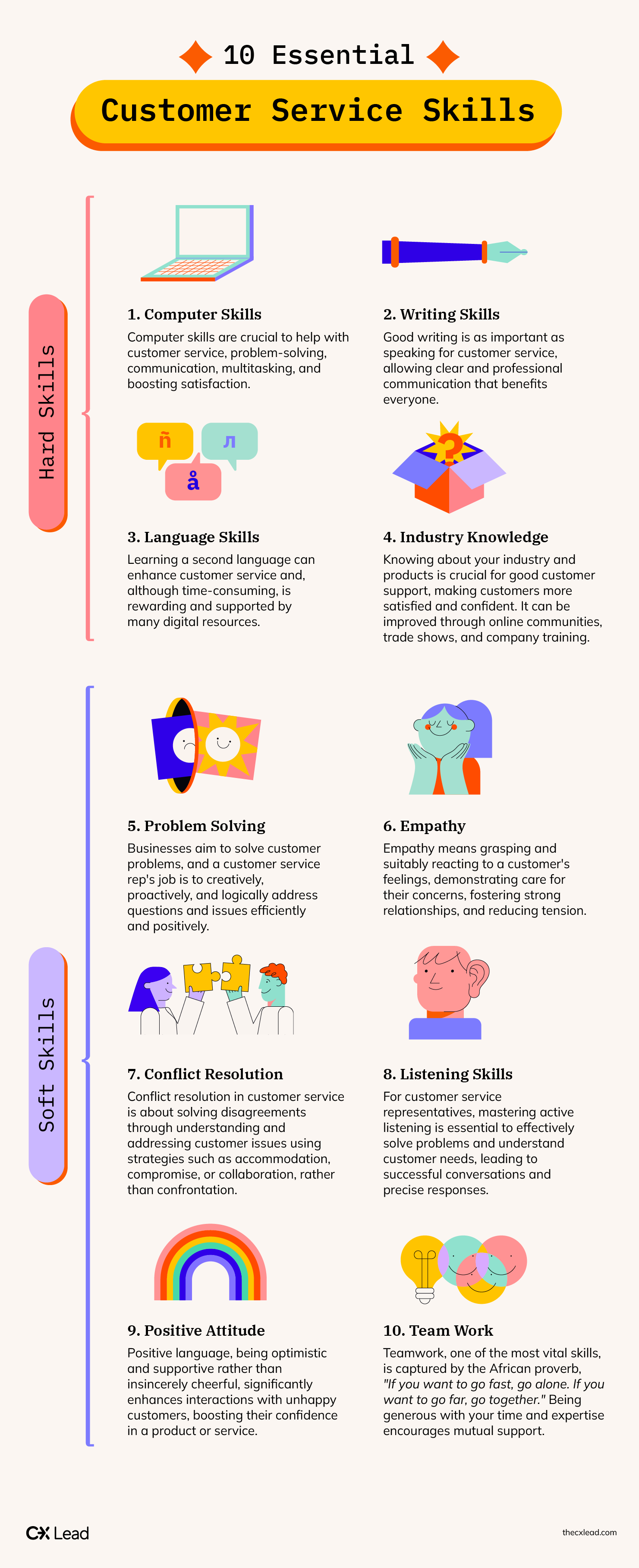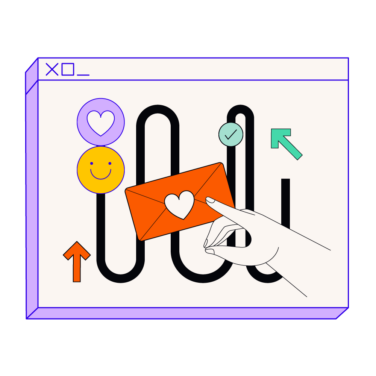Customer service software isn't the only factor determining a customer's service experience, nor is the company's service strategy. Above all else, it are the skills of the frontline agents that play the largest role.
In this article, we will take a look at 10 of the most important customer service skills that should be part of your professional repertoire.

Essential Customer Service Skills: Hard Skills
Hard skills are easily measurable abilities such as maths, computer programming or graphic design. As a customer service rep, these are the hard skills you’ll do well to master.
1. Computer Skills
Computer skills are a prerequisite for almost anyone in today's business world. Being able to use software is necessary for customer service reps in order to provide a timely response.
Even though your role probably doesn't require advanced technical skills, competent computer literacy will come in handy when troubleshooting a customer's problem or when a question goes beyond your knowledge.
Without basic computer skills, communication with the customer and your team is stalled and unorganized. Skilled use of computer programs helps you with multitasking, time management, and tracking client information. Each time you interact with a customer or your customer service team you will be able to easily track ongoing interactions that are important for avoiding mistakes and improving customer satisfaction.
To improve your computer literacy, take advantage of many of the free online courses available.
2. Writing Skills
While any support rep knows that verbal communication is essential to excellent customer service, writing skills are just as important. Good writing skills allow you to communicate your message with professionalism and clarity. Both customers and fellow workers will benefit from this.
There are lots of online resources that can help you brush up your writing skills. Regular reading and writing practice will pay off as well.
3. Language Skills
While knowing a second language is not always essential when you are working as a customer service representative, it is a skill that can really enhance the customer experience.
While mastering a new language can be quite time-consuming, it is a rewarding process in itself. There’s a plethora of digital apps and courses to help you get started. By honing both your written and verbal language skills then you have the two hard communication skills necessary to succeed as a customer service rep. You'll have adaptability across multiple channels, from call centers to social media.
4. Industry Knowledge
Industry and product knowledge are essential for competent customer support and ensuring customers leave the conversation satisfied. It’s a cliché but knowledge really is power, and anything extra you can impart will increase customer confidence.
Extra knowledge can be gained through reading books, blogs, studying, online communities and attending industry-specific trade shows. Of course, your company should also provide requisite training to deepen your understanding of customer service management when you start a new position.
Essential Customer Service Skills: Soft Skills
Soft skills are a bit harder to quantify than hard skills but are just as important. For top customer service reps these will come naturally, but it’s always worth identifying areas of improvement and honing them further.
5. Problem Solving
In one way or another, all businesses solve a problem for their customers (although we’re not sure about pet rocks and rubber chickens). Fundamentally, a customer service rep’s job is to do whatever it takes to answer questions, deal with any problems surrounding that solution, and handle it all with a smile.
Speed and efficiency are the hallmarks of any great customer service experience, so being able to quickly get to the bottom of a problem is crucial. It takes creativity, initiative, and logical thinking. It’s also beneficial to understand the problem-solving process.
6. Empathy
Empathy means demonstrating the emotional intelligence to understand what a customer is feeling and respond appropriately.
Being empathetic shows that you (and by extension the company) care and take the customer’s issues seriously. Emotional intelligence and empathy are instrumental in building a strong and lasting customer relationship.Showing empathy can help reduce the tension while finding solutions, even if you are ultimately unable to solve each and every one of the customer’s issues. There are many blogs with resources on improving your empathetic customer service abilities.
Related Read: The 10 Best Customer Intelligence Platforms
7. Conflict Resolution
This soft skill is central to customer service. While we often think of conflict as a fight, it is really about mitigating the back and forth that happens in a disagreement. You do not want to be in conflict with an angry customer, you want to untangle their issues and offer solutions.
There are different types of conflict resolution strategies and you would do well to be familiar with them all. Different scenarios will require different approaches. One day you may find that the accommodation style suits you best; another day, you might have to lean hard on either compromising or collaborating.
Conflict resolution direction and support advice for customer service professionals is easy to find. Online courses are a great way to start learning about how to settle conflict positively both for you, the customer, and the team as a whole.
8. Listening Skills
Listening is a soft skill that all customer service representatives (and let’s face it, everyone) should master. Being able to properly listen to customer issues is critical for problem-solving and understanding customers' needs.
Intentionally listening to customer feedback makes for a successful conversation where you can ask follow-up questions and then provide accurate information to your customer.
Reading blogs and books can help you learn the fine art of active listening, and letting customers know you are by using indicators such as body language and eye contact. Without active listening and the attentiveness it engenders, it's difficult to make the customer feel heard and understood.
9. Positive Attitude
A healthy dose of positivity when dealing with customers can go a long way.
Positive language doesn't mean falsely sunny and bright, it more so means being optimistic while assisting others.
Working on being encouraging, reassuring, and positive can make a difference when interacting with unhappy customers who are feeling negative or unsure about a product or service. There are blogs that are helpful for learning how to do this, along with self-help books as well.
10. Teamwork
Last, but certainly not least, one of the most important skills in the world. There’s an African proverb that goes “if you want to go fast, go alone. If you want to go far, go together.” At some point, you’ll hit a roadblock and rely on another team member for help. Odds are they’ll be much more inclined to help if you’re generous with your time and expertise.
If you recognize yourself as a bit of a lone ranger, think about ways you can be more accessible to others. Also, think about your team—do they work together as a cohesive unit? Here are some ways to improve your and your team’s team working skills.
Conclusion
Whether you are entering the customer service field as a beginner, or have been in the industry for years, the above skills are all necessary for providing a good customer service offering that will be of value to your company. And if you're looking to hire a team of customer service agents—or outsource your customer services—these are the skills you should evaluate for.
Are you a customer service agent or team leader looking to progress in your career and keep up with all the latest in the customer experience world? Subscribe to the CX Lead newsletter for expert advice and tips delivered straight to your inbox
For tools to help you and your team, check this list out: 10 Best AI Chatbots For Customer Service Performance


